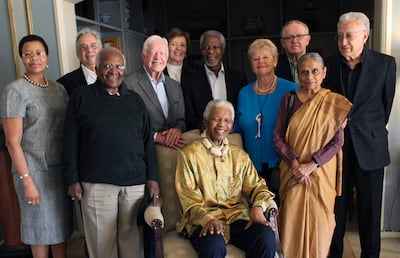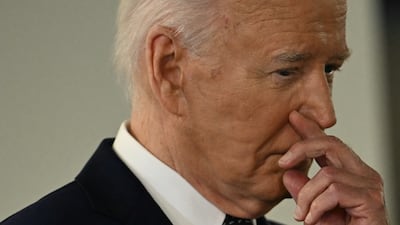For months, and not just after his disastrous presidential debate appearance, Americans have been saying that Joe Biden is too old to serve another term in the White House. In a February poll for ABC News, 86 per cent of those surveyed said so. That was up from 74 per cent last September.
It is a sure bet that no one changed their mind for the better about Mr Biden after watching his excruciating performance last week. But Mr Biden’s age – he’s 81 – is not the real issue. That is his evident mental and physical decline.
I make the distinction because I feel we are collectively in danger of drawing the wrong lesson here. And I say so with confidence because of the examples we’ve had in South-East and East Asia, where some of the most towering figures in national, regional and global politics have continued well into old age, and their peoples have had cause to thank them for their continued service.
Malaysia’s current Prime Minister, Anwar Ibrahim, is 76, only five years younger than Mr Biden, but he’s as sprightly and acute as ever. His age simply isn’t an issue. In Singapore, the country’s founding leader, Lee Kuan Yew, continued in office as Senior Minister and then Minister Mentor during his 80s, finally stepping down at the age of 87.
If anyone doubted that the formidable Mr Lee wasn’t still a force to be reckoned with in his later years, they should have remembered what he’d said before: “Even from my sickbed, even if you are going to lower me into the grave and I feel that something is going wrong, I will get up. Those who believe that after I have left the government as prime minister, I will go into a permanent retirement, really should have their heads examined.”
The former Thai leader Prem Tinsulanonda was president of the country’s influential Privy Council from 1998 until his death aged 98 in 2019, and played a hugely important role – often semi-behind the scenes – in trying to steer a country prone to coups and protests towards a stable path, enabled by his position as a representative of the revered royal institution.
China’s former paramount leader, Deng Xiaoping, was in power well into his 80s, and was 87 when he undertook his “southern tour”, which many credit with saving the country’s economic reform programme that laid the foundations for its great successes today.
And of course in Malaysia, where I live, in 2018 the then 93-year-old Mahathir Mohamad returned as prime minister for a second time. He may have “often looked and felt extremely tired and frequently visited the hospital for various health checks”, as Romen Bose notes in his fast-paced and insightful new book on the Mahathir administration, Shattered Hopes, but when he turned his mind to something his focus remained laser-like, as his political foes found to their cost.
It may have been partly due to local or regional culture, but it was noticeable at the time that almost nobody in the country seemed to think that electing a nonagenarian as prime minister would be ridiculous. Maybe that wasn’t just “Asian values” in action. For revering experience in many fields is, after all, quite normal. To call someone an “elder statesman” is a compliment, implying valuable depths of knowledge and judgment.
There was a reason why Nelson Mandela called his new group “the Elders” when he founded it in 2007. The six retired leaders were widely recognised as having the moral authority and experience to “support courage where there is fear, foster agreement where there is conflict and inspire hope where there is despair”, as Mr Mandela put it.
Former US president Jimmy Carter was among them. Mr Carter is 99 and in a hospice, and perhaps I am speaking for myself here, but is there anyone alive today who is as much admired for his ethical clarity?
Malaysia’s current Prime Minister, Anwar Ibrahim, is 76, only five years younger than Mr Biden, but he’s as sprightly and acute as ever
Youth, on the other hand, may often be overrated.
Emmanuel Macron was only 39 when he was first elected President of France. He proclaimed that he was bringing a fresh approach to politics, under his “alternative centrism”, which, to many, looked right wing and out of touch with ordinary voters. In the years since, the far-right National Rally has steadily gained ground to the point that it appears poised to win the second round of France’s parliamentary election this weekend.
Those who regard that prospect as a catastrophe point the finger of blame firmly at Mr Macron. An older conservative in the mould of former president Jacques Chirac may have been able to keep the populists to the margins, as he did.
But Mr Macron is a mature oak compared to what could come next. If the National Rally does win an overall majority, its candidate to be prime minister is Jordan Bardella. Friends who have met him describe him as impressive, but at 28 could he possibly have what it takes to lead a government of the world’s seventh-largest economy?
Coming to power at an early or earlyish age presents another problem: what to do during the decades once you are out.
For UK prime ministers, to take one example, the experience has been mixed. Tony Blair left office at the relatively youthful age of 54 and, whatever his critics say, has maintained his commitment to public service with international, academic and charity roles and his own institute.
Another predecessor, Ted Heath, remained an MP for 27 years after losing the premiership, but the ill grace he never ceased to display at losing the Tory leadership in 1975 earned him the nickname “the incredible sulk”. Before returning as foreign secretary, David Cameron was reported to have told friends just how “bored” he was two years after leaving Downing Street aged 49.
So, in all the discussions about Mr Biden, let us not forget the value of age and experience. The problem is not how old he is, but that he no longer has what China’s Mr Deng and Singapore’s Mr Lee manifestly had well into their 80s – a mind (and in Mr Lee’s case a tongue) as sharp as a razor. And not just on “good” days.
Reputation
Taylor Swift
(Big Machine Records)
2025 Fifa Club World Cup groups
Group A: Palmeiras, Porto, Al Ahly, Inter Miami.
Group B: Paris Saint-Germain, Atletico Madrid, Botafogo, Seattle.
Group C: Bayern Munich, Auckland City, Boca Juniors, Benfica.
Group D: Flamengo, ES Tunis, Chelsea, (Leon banned).
Group E: River Plate, Urawa, Monterrey, Inter Milan.
Group F: Fluminense, Borussia Dortmund, Ulsan, Mamelodi Sundowns.
Group G: Manchester City, Wydad, Al Ain, Juventus.
Group H: Real Madrid, Al Hilal, Pachuca, Salzburg.
Specs
Engine: Duel electric motors
Power: 659hp
Torque: 1075Nm
On sale: Available for pre-order now
Price: On request
THE%20HOLDOVERS
%3Cp%3E%3Cstrong%3EDirector%3A%20%3C%2Fstrong%3EAlexander%20Payne%3C%2Fp%3E%0A%3Cp%3E%3Cstrong%3EStarring%3A%3C%2Fstrong%3E%20Paul%20Giamatti%2C%20Da'Vine%20Joy%20Randolph%2C%20Dominic%20Sessa%3C%2Fp%3E%0A%3Cp%3E%3Cstrong%3ERating%3A%3C%2Fstrong%3E%204.5%2F5%3C%2Fp%3E%0A
UAE squad
Esha Oza (captain), Al Maseera Jahangir, Emily Thomas, Heena Hotchandani, Indhuja Nandakumar, Katie Thompson, Lavanya Keny, Mehak Thakur, Michelle Botha, Rinitha Rajith, Samaira Dharnidharka, Siya Gokhale, Sashikala Silva, Suraksha Kotte, Theertha Satish (wicketkeeper) Udeni Kuruppuarachchige, Vaishnave Mahesh.
UAE tour of Zimbabwe
All matches in Bulawayo
Friday, Sept 26 – First ODI
Sunday, Sept 28 – Second ODI
Tuesday, Sept 30 – Third ODI
Thursday, Oct 2 – Fourth ODI
Sunday, Oct 5 – First T20I
Monday, Oct 6 – Second T20I
UAE currency: the story behind the money in your pockets
The five pillars of Islam
Killing of Qassem Suleimani
BRAZIL%20SQUAD
%3Cp%3EGoalkeepers%3A%20Alisson%2C%20Ederson%2C%20Weverton%3Cbr%3E%3Cbr%3EDefenders%3A%20Dani%20Alves%2C%20Marquinhos%2C%20Thiago%20Silva%2C%20Eder%20Militao%20%2C%20Danilo%2C%20Alex%20Sandro%2C%20Alex%20Telles%2C%20Bremer.%3Cbr%3E%3Cbr%3EMidfielders%3A%20Casemiro%2C%20Fred%2C%20Fabinho%2C%20Bruno%20Guimaraes%2C%20Lucas%20Paqueta%2C%20Everton%20Ribeiro.%3Cbr%3E%3Cbr%3EForwards%3A%20Neymar%2C%20Vinicius%20Junior%2C%20Richarlison%2C%20Raphinha%2C%20Antony%2C%20Gabriel%20Jesus%2C%20Gabriel%20Martinelli%2C%20Pedro%2C%20Rodrygo%3C%2Fp%3E%0A
COMPANY%20PROFILE
%3Cp%3E%3Cstrong%3EName%3A%20%3C%2Fstrong%3EEjari%3Cbr%3E%3Cstrong%3EBased%3A%20%3C%2Fstrong%3ERiyadh%2C%20Saudi%20Arabia%3Cbr%3E%3Cstrong%3EFounders%3A%20%3C%2Fstrong%3EYazeed%20Al%20Shamsi%2C%20Fahad%20Albedah%2C%20Mohammed%20Alkhelewy%20and%20Khalid%20Almunif%3Cbr%3E%3Cstrong%3ESector%3A%20%3C%2Fstrong%3EPropTech%3Cbr%3E%3Cstrong%3ETotal%20funding%3A%20%3C%2Fstrong%3E%241%20million%3Cbr%3E%3Cstrong%3EInvestors%3A%20%3C%2Fstrong%3ESanabil%20500%20Mena%2C%20Hambro%20Perks'%20Oryx%20Fund%20and%20angel%20investors%3Cbr%3E%3Cstrong%3ENumber%20of%20employees%3A%20%3C%2Fstrong%3E8%3C%2Fp%3E%0A
Apple's%20Lockdown%20Mode%20at%20a%20glance
%3Cp%3EAt%20launch%2C%20Lockdown%20Mode%20will%20include%20the%20following%20protections%3A%3C%2Fp%3E%0A%3Cp%3E%3Cstrong%3EMessages%3A%3C%2Fstrong%3E%20Most%20attachment%20types%20other%20than%20images%20are%20blocked.%20Some%20features%2C%20like%20link%20previews%2C%20are%20disabled%3C%2Fp%3E%0A%3Cp%3E%3Cstrong%3EWeb%20browsing%3A%3C%2Fstrong%3E%20Certain%20complex%20web%20technologies%2C%20like%20just-in-time%20JavaScript%20compilation%2C%20are%20disabled%20unless%20the%20user%20excludes%20a%20trusted%20site%20from%20Lockdown%20Mode%3C%2Fp%3E%0A%3Cp%3E%3Cstrong%3EApple%20services%3A%20%3C%2Fstrong%3EIncoming%20invitations%20and%20service%20requests%2C%20including%20FaceTime%20calls%2C%20are%20blocked%20if%20the%20user%20has%20not%20previously%20sent%20the%20initiator%20a%20call%20or%20request%3C%2Fp%3E%0A%3Cp%3E%3Cstrong%3EConnectivity%3A%3C%2Fstrong%3E%20Wired%20connections%20with%20a%20computer%20or%20accessory%20are%20blocked%20when%20an%20iPhone%20is%20locked%3C%2Fp%3E%0A%3Cp%3E%3Cstrong%3EConfigurations%3A%3C%2Fstrong%3E%20Configuration%20profiles%20cannot%20be%20installed%2C%20and%20the%20device%20cannot%20enroll%20into%20mobile%20device%20management%20while%20Lockdown%20Mode%20is%20on%3C%2Fp%3E%0A
The specs
Engine: four-litre V6 and 3.5-litre V6 twin-turbo
Transmission: six-speed and 10-speed
Power: 271 and 409 horsepower
Torque: 385 and 650Nm
Price: from Dh229,900 to Dh355,000
Squad
Ali Kasheif, Salim Rashid, Khalifa Al Hammadi, Khalfan Mubarak, Ali Mabkhout, Omar Abdulrahman, Mohammed Al Attas, Abdullah Ramadan, Zayed Al Ameri (Al Jazira), Mohammed Al Shamsi, Hamdan Al Kamali, Mohammed Barghash, Khalil Al Hammadi (Al Wahda), Khalid Essa, Mohammed Shaker, Ahmed Barman, Bandar Al Ahbabi (Al Ain), Al Hassan Saleh, Majid Suroor (Sharjah) Walid Abbas, Ahmed Khalil (Shabab Al Ahli), Tariq Ahmed, Jasim Yaqoub (Al Nasr), Ali Saleh, Ali Salmeen (Al Wasl), Hassan Al Muharami (Baniyas)
The smuggler
Eldarir had arrived at JFK in January 2020 with three suitcases, containing goods he valued at $300, when he was directed to a search area.
Officers found 41 gold artefacts among the bags, including amulets from a funerary set which prepared the deceased for the afterlife.
Also found was a cartouche of a Ptolemaic king on a relief that was originally part of a royal building or temple.
The largest single group of items found in Eldarir’s cases were 400 shabtis, or figurines.
Khouli conviction
Khouli smuggled items into the US by making false declarations to customs about the country of origin and value of the items.
According to Immigration and Customs Enforcement, he provided “false provenances which stated that [two] Egyptian antiquities were part of a collection assembled by Khouli's father in Israel in the 1960s” when in fact “Khouli acquired the Egyptian antiquities from other dealers”.
He was sentenced to one year of probation, six months of home confinement and 200 hours of community service in 2012 after admitting buying and smuggling Egyptian antiquities, including coffins, funerary boats and limestone figures.
For sale
A number of other items said to come from the collection of Ezeldeen Taha Eldarir are currently or recently for sale.
Their provenance is described in near identical terms as the British Museum shabti: bought from Salahaddin Sirmali, "authenticated and appraised" by Hossen Rashed, then imported to the US in 1948.
- An Egyptian Mummy mask dating from 700BC-30BC, is on offer for £11,807 ($15,275) online by a seller in Mexico
- A coffin lid dating back to 664BC-332BC was offered for sale by a Colorado-based art dealer, with a starting price of $65,000
- A shabti that was on sale through a Chicago-based coin dealer, dating from 1567BC-1085BC, is up for $1,950
Game Changer
Director: Shankar
Stars: Ram Charan, Kiara Advani, Anjali, S J Suryah, Jayaram
Rating: 2/5
Hot%20Seat
%3Cp%3EDirector%3A%20James%20Cullen%20Bressack%3Cbr%3E%3Cbr%3EStars%3A%20Mel%20Gibson%2C%20Kevin%20Dillon%2C%20Shannen%20Doherty%2C%20Sam%20Asghari%3Cbr%3E%3Cbr%3ERating%3A%201%2F5%3C%2Fp%3E%0A
'THE WORST THING YOU CAN EAT'
Trans fat is typically found in fried and baked goods, but you may be consuming more than you think.
Powdered coffee creamer, microwave popcorn and virtually anything processed with a crust is likely to contain it, as this guide from Mayo Clinic outlines:
Baked goods - Most cakes, cookies, pie crusts and crackers contain shortening, which is usually made from partially hydrogenated vegetable oil. Ready-made frosting is another source of trans fat.
Snacks - Potato, corn and tortilla chips often contain trans fat. And while popcorn can be a healthy snack, many types of packaged or microwave popcorn use trans fat to help cook or flavour the popcorn.
Fried food - Foods that require deep frying — french fries, doughnuts and fried chicken — can contain trans fat from the oil used in the cooking process.
Refrigerator dough - Products such as canned biscuits and cinnamon rolls often contain trans fat, as do frozen pizza crusts.
Creamer and margarine - Nondairy coffee creamer and stick margarines also may contain partially hydrogenated vegetable oils.
UAE currency: the story behind the money in your pockets
Kanguva
Director: Siva
Stars: Suriya, Bobby Deol, Disha Patani, Yogi Babu, Redin Kingsley
Company Profile
Name: Thndr
Started: 2019
Co-founders: Ahmad Hammouda and Seif Amr
Sector: FinTech
Headquarters: Egypt
UAE base: Hub71, Abu Dhabi
Current number of staff: More than 150
Funds raised: $22 million
The specs
Engine: 2.0-litre 4-cyl turbo
Power: 201hp at 5,200rpm
Torque: 320Nm at 1,750-4,000rpm
Transmission: 6-speed auto
Fuel consumption: 8.7L/100km
Price: Dh133,900
On sale: now
Inside%20Out%202
%3Cp%3E%3Cstrong%3EDirector%3A%C2%A0%3C%2Fstrong%3EKelsey%20Mann%3C%2Fp%3E%0A%3Cp%3E%3Cstrong%3EStarring%3A%3C%2Fstrong%3E%C2%A0Amy%20Poehler%2C%20Maya%20Hawke%2C%20Ayo%20Edebiri%3C%2Fp%3E%0A%3Cp%3E%3Cstrong%3ERating%3A%20%3C%2Fstrong%3E4.5%2F5%3C%2Fp%3E%0A
Company%20profile
%3Cp%3E%3Cstrong%3ECompany%20name%3A%20%3C%2Fstrong%3EHakbah%0D%3Cbr%3E%3Cstrong%3EStarted%3A%20%3C%2Fstrong%3E2018%0D%3Cbr%3E%3Cstrong%3EFounder%3A%20%3C%2Fstrong%3ENaif%20AbuSaida%0D%3Cbr%3E%3Cstrong%3EBased%3A%20%3C%2Fstrong%3ESaudi%20Arabia%0D%3Cbr%3E%3Cstrong%3ESector%3A%20%3C%2Fstrong%3EFinTech%0D%3Cbr%3E%3Cstrong%3ECurrent%20number%20of%20staff%3A%20%3C%2Fstrong%3E22%20%0D%3Cbr%3E%3Cstrong%3EInitial%20investment%3A%20%3C%2Fstrong%3E%24200%2C000%0D%3Cbr%3E%3Cstrong%3EInvestment%20stage%3A%20%3C%2Fstrong%3Epre-Series%20A%0D%3Cbr%3E%3Cstrong%3EInvestors%3A%20%3C%2Fstrong%3EGlobal%20Ventures%20and%20Aditum%20Investment%20Management%0D%3Cbr%3E%3Cbr%3E%3C%2Fp%3E%0A
Countries recognising Palestine
France, UK, Canada, Australia, Portugal, Belgium, Malta, Luxembourg, San Marino and Andorra
Diriyah%20project%20at%20a%20glance
%3Cp%3E-%20Diriyah%E2%80%99s%201.9km%20King%20Salman%20Boulevard%2C%20a%20Parisian%20Champs-Elysees-inspired%20avenue%2C%20is%20scheduled%20for%20completion%20in%202028%0D%3Cbr%3E-%20The%20Royal%20Diriyah%20Opera%20House%20is%20expected%20to%20be%20completed%20in%20four%20years%0D%3Cbr%3E-%20Diriyah%E2%80%99s%20first%20of%2042%20hotels%2C%20the%20Bab%20Samhan%20hotel%2C%20will%20open%20in%20the%20first%20quarter%20of%202024%0D%3Cbr%3E-%20On%20completion%20in%202030%2C%20the%20Diriyah%20project%20is%20forecast%20to%20accommodate%20more%20than%20100%2C000%20people%0D%3Cbr%3E-%20The%20%2463.2%20billion%20Diriyah%20project%20will%20contribute%20%247.2%20billion%20to%20the%20kingdom%E2%80%99s%20GDP%0D%3Cbr%3E-%20It%20will%20create%20more%20than%20178%2C000%20jobs%20and%20aims%20to%20attract%20more%20than%2050%20million%20visits%20a%20year%0D%3Cbr%3E-%20About%202%2C000%20people%20work%20for%20the%20Diriyah%20Company%2C%20with%20more%20than%2086%20per%20cent%20being%20Saudi%20citizens%0D%3C%2Fp%3E%0A
FORSPOKEN
%3Cp%3EDeveloper%3A%20Luminous%20Productions%0D%3Cbr%3EPublisher%3A%20Square%20Enix%0D%3Cbr%3EConsole%3A%20PC%2C%20PS5%0D%3Cbr%3ERelease%20date%3A%20January%3C%2Fp%3E%0A
Company%20of%20Heroes%203
%3Cp%3EDeveloper%3A%20Relic%20Entertainment%3Cbr%3EPublisher%3A%20SEGA%3Cbr%3EConsole%3A%20PC%2C%20PS5%2C%20XSX%3Cbr%3ERelease%20date%3A%20February%3C%2Fp%3E%0A
Star%20Wars%20Jedi%3A%20Survivor
%3Cp%3EDeveloper%3A%20Respawn%20Entertainment%0D%3Cbr%3EPublisher%3A%20Electronic%20Arts%0D%3Cbr%3EConsole%3A%20PC%2C%20PS5%2C%20XSX%0D%3Cbr%3ERelease%20date%3A%20March%3C%2Fp%3E%0A
Suicide%20Squad%3A%20Kill%20the%20Justice%20League
%3Cp%3EDeveloper%3A%20Rocksteady%20Studios%0D%3Cbr%3EPublisher%3A%20Warner%20Bros%0D%3Cbr%3EConsole%3A%20PC%2C%20PS5%2C%20XSX%0D%3Cbr%3ERelease%20date%3A%20May%3C%2Fp%3E%0A
Final%20Fantasy%20XVI
%3Cp%3EDeveloper%3A%20Square%20Enix%0D%3Cbr%3EPublisher%3A%20Square%20Enix%0D%3Cbr%3EConsole%3A%20PS5%0D%3Cbr%3ERelease%20date%3A%20June%3C%2Fp%3E%0A
Street%20Fighter%206
%3Cp%3EDeveloper%3A%20Capcom%0D%3Cbr%3EPublisher%3A%20Capcom%0D%3Cbr%3EConsole%3A%20PS5%2C%20XSX%2C%20PC%0D%3Cbr%3ERelease%20date%3A%20June%3C%2Fp%3E%0A
Diablo%20IV
%3Cp%3EDeveloper%3A%20Blizzard%20Entertainment%0D%3Cbr%3EPublisher%3A%20Blizzard%20Entertainment%0D%3Cbr%3EConsole%3A%20PC%2C%20PS5%2C%20XSX%0D%3Cbr%3ERelease%20date%3A%20June%3C%2Fp%3E%0A
Baldur's%20Gate%203
%3Cp%3EDeveloper%3A%20Larian%20Studios%0D%3Cbr%3EPublisher%3A%20Larian%20Studios%0D%3Cbr%3EConsole%3A%20PC%0D%3Cbr%3ERelease%20date%3A%20August%3C%2Fp%3E%0A
The%20Legend%20of%20Zelda%3A%20Tears%20of%20The%20Kingdom
%3Cp%3EDeveloper%3A%20Nintendo%0D%3Cbr%3EPublisher%3A%20Nintendo%0D%3Cbr%3EConsole%3A%20Nintendo%20Switch%0D%3Cbr%3ERelease%20date%3A%20September%3C%2Fp%3E%0A
Marvel's%20Spider-Man%202
%3Cp%3EDeveloper%3A%20Insomniac%20Games%0D%3Cbr%3EPublisher%3A%20PlayStation%0D%3Cbr%3EConsole%3A%20PS5%0D%3Cbr%3ERelease%20date%3A%20Fall%3C%2Fp%3E%0A
Assassin's%20Creed%20Mirage
%3Cp%3EDeveloper%3A%20Ubisoft%0D%3Cbr%3EPublisher%3A%20Ubisoft%0D%3Cbr%3EConsole%3A%20PC%2C%20PS5%2C%20XSX%2C%20Amazon%20Luna%0D%3Cbr%3ERelease%20date%3A%202023%3C%2Fp%3E%0A
Starfield
%3Cp%3EDeveloper%3A%20Bethesda%20Game%20Studios%0D%3Cbr%3EPublisher%3A%20Bethesda%20Softworks%0D%3Cbr%3EConsole%3A%20PC%2C%20Xbox%0D%3Cbr%3ERelease%20date%3A%202023%3C%2Fp%3E%0A



